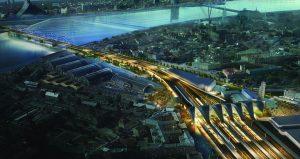 A team of experts from Rambøll Denmark A/S and Rambøll GmbH has started working on a study for integrated railway infrastructure development for the Riga node.
A team of experts from Rambøll Denmark A/S and Rambøll GmbH has started working on a study for integrated railway infrastructure development for the Riga node.
EUR 151 596 is the value of the contract for the study elaboration and the results will be delivered in four months. 85% of the cost of this research are funded by the Connecting Europe Facility of the European Union.
The study will evaluate the most optimal way to integrate the existing railway network and the new Rail Baltica line in a single and coordinated railway network for Latvia.
This study links with the strategic objective of the Latvian Ministry of Transport to increase the share of rail for passenger transport and to promote the shift of passengers from private cars and busses to trains.
The study will develop an operational analysis of the Riga railway node for short (2026), medium (2036) and long term (2046) time periods. The study is led by RB Rail AS, on behalf of the Ministry of Transport, in cooperation with partners from Latvian Railways, Pasažieru vilciens, Road Transport Administration and Eiropas Dzelzceļa līnjas.
According to the Rail Baltica operational plan, developed in 2019, the new Rail Baltica infrastructure will be used not only for the high-speed international trains but also for operating new regional train services inside Latvia and regional cross-border services with Estonia and Lithuania. It is planned for the regional trains on Rail Baltica line to travel with the maximum speed of up to 200 km/h. In Latvia, 10 regional stops are planned in the section from Bauska to Salacgrīva. The implementation of regional services using the Rail Baltica infrastructure will provide an opportunity to significantly reduce the travel time for people who regularly commute to and from Rīga from the northern and southern regions of Latvia.
Share on:



